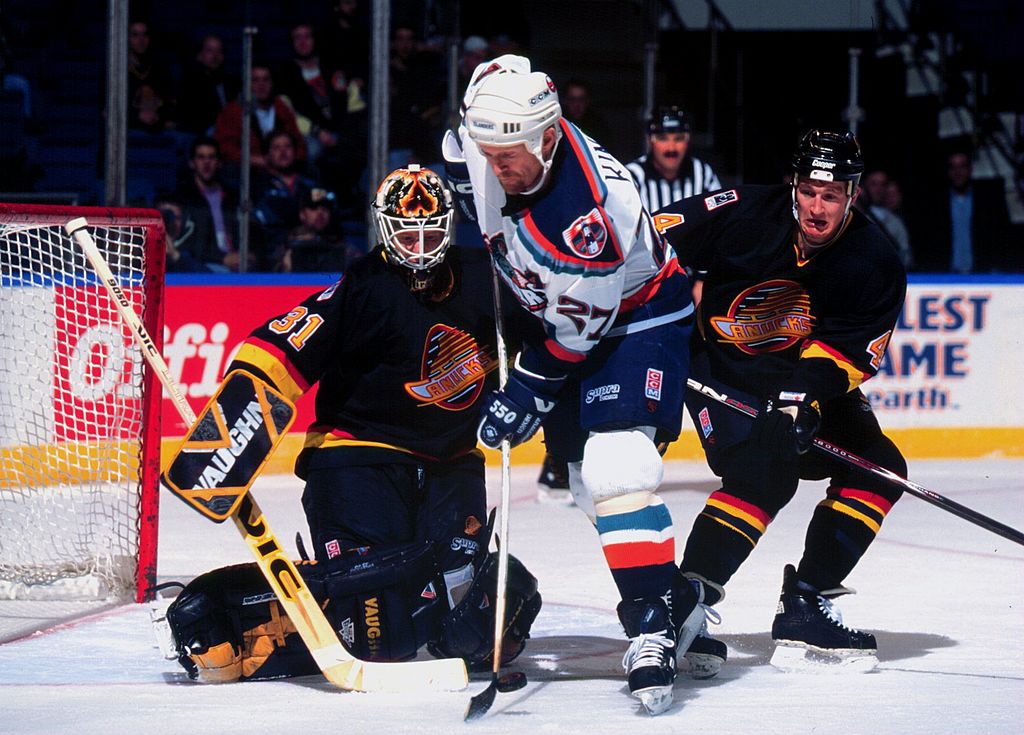“Reach out, get some help. It’s there and it’s available.”

Former Vancouver Canucks goalie Corey Hirsch is continuing to talk about his battle with obsessive-compulsive disorder (OCD) after opening up about his history in an article on Player’s Tribune this week.
Hirsch played for four NHL teams in a pro career that included backstopping Canada to a silver medal at the 1994 Olympic Winter Games. But his career, even at its peak, took second string to the constant struggle inside his head.
In his article, Hirsch describes the scene when suicidal thoughts nearly made him drive off a cliff near Kamloops in 1994.
Panic attacks and obsessive thoughts plagued much of his NHL career until his second season with the Canucks in 1995 when he finally confided in a team trainer. He eventually saw a psychiatrist and was diagnosed with OCD, something he said came as a huge relief.
“Being diagnosed meant that there was something that people knew about and that they could help me,” Hirsch told Global News in a one-on-one interview Saturday.
Until he learned of his OCD diagnosis, he thought he was going to live in misery for the rest of his life.
But treatment has gifted him an “awesome life” today. He’s now taking the opportunity to publicly discuss his mental health struggles in hopes that he can help others battling the same thing.
The response to his blog post this week has proved to him how supportive people are.
“It’s been overwhelming to say the least,” Hirsch said.
The opportunity to talk publicly about his past is something Hirsch only ever dreamed about, until recently.
“I remember days where I was lying in bed and I was struggling and I could barely get out of bed, dreaming and hoping that this day today would come, that I could tell my story and share it, and have an impact,” Hirsch said. “I’m just absolutely blown away by the response from people… this has been like a dream come true for me.”
Hirsch says OCD can show itself in several forms. For him, it was something called Pure ODC – or “Pure O” – a form of OCD that manifests only in the mind through things like obsessive unwanted thoughts, mental rituals and impulses. It can also include recurrent thoughts or mental images of hurting oneself or others.
For Hirsch, it was dark, unmanageable thoughts hammering him day and night.
“But as I was standing there in the bar, the dark thought wouldn’t go away. It kept repeating and repeating. I was actively trying to get it out of my head — but the more I tried, the more I couldn’t stop thinking this horrible, dark, ridiculous thought. The thought hammered me, and I started freaking out. I wasn’t drunk. I wasn’t mad. I wasn’t anything,” he wrote in his original Players’ Tribune article.
In hindsight, he thinks friends and teammates could probably tell something was wrong, but he never talked about it. In the ’90s, talking about mental health and therapy wasn’t normal, he says.
“I’m very outgoing and very social, and then I just completely withdrew. When you see that in somebody, there’s something else going on there. They may not reach out to you but just be there for them to listen,” Hirsch said, also offering a morsel of advice:
“When you’re speaking to somebody in a situation like that, to tell them how great their life is, it doesn’t matter. They’re not in a place to hear that.”
Today he hopes anyone with a mental illness has access to the resources to be diagnosed and treated. While there’s still a stigma for disorders like OCD, it’s come a long way since Hirsch stood on that Kamloops cliff in 1994.
“We need to get it so that our kids in schools and parents know about this, so that if they see it in their children and it happens, right away get them some help and get them some therapy,” he said.
Now with decades of therapy, the darkness that once plagued Hirsch is being used for good – he says he’s here to listen to anyone who needs an ear.
“Talking to you… this is probably one of the best days of my life.”




Comments